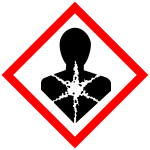Notified classification and labelling according to CLP criteria
General Section
EC / List no.

|
Name |
CAS Number

|
Additional Notified Information

|
|---|---|---|---|
| 231-892-1 | Disodium peroxodisulphate | 7775-27-1 |
State/Form
|
| Classification | Labelling | Specific Concentration limits, M-Factors | Notes |
Classification affected by Impurities / Additives

|
||
|---|---|---|---|---|---|---|
| Hazard Class and Category Code(s) | Hazard Statement Code(s) | Hazard Statement Code(s) | Supplementary Hazard Statement Code(s) | |||
| Ox. Sol. 3 | H272 | H272 | ||||
| Acute Tox. 4 | H302 | H302 | ||||
| Skin Irrit. 2 | H315 | H315 | ||||
| Skin Sens. 1 | H317 | H317 | ||||
| Eye Irrit. 2 | H319 | H319 | ||||
| Resp. Sens. 1 | H334 | H334 | ||||
| STOT SE 3 | H335 (Respiratory Tra...) (inhalation) | H335 | ||||
| Signal Words | Pictograms | |||||||||
|---|---|---|---|---|---|---|---|---|---|---|
| Danger |
|
Detailed Information on classification and labelling
Classification
| Physical and Chemical hazards | |||
|---|---|---|---|
| Hazard Category | Hazard Statement |
Reason for no Classification

|
|
| Explosives | hazard class not applicable | ||
| Flammable Gases and Chemically Unstable Gases | hazard class not applicable | ||
| Flammable Aerosols | hazard class not applicable | ||
| Oxidising Gases | hazard class not applicable | ||
| Gases Under Pressure | hazard class not applicable | ||
| Flammable Liquids | hazard class not applicable | ||
| Flammable Solids | hazard class not applicable | ||
| Self-reactive Substances and Mixtures | hazard class not applicable | ||
| Pyrophoric Liquids | hazard class not applicable | ||
| Pyrophoric Solids | hazard class not applicable | ||
| Self-heating Substances and Mixtures | hazard class not applicable | ||
| Substances and Mixtures which in contact with water emit flammable gases | hazard class not applicable | ||
| Oxidising Liquids | hazard class not applicable | ||
| Oxidising Solids | Ox. Sol. 3 | H272 | |
| Organic Peroxides | hazard class not applicable | ||
| Substances and Mixtures corrosive to Metals | hazard class not applicable | ||
| Desensitized Explosives | hazard class not applicable | ||
| Human Health hazards | |||
| Hazard Category | Hazard Statement |
Reason for no Classification

|
|
| Acute Toxicity - Oral | Acute Tox. 4 | H302 | |
| Acute Toxicity - Dermal | hazard class not applicable | ||
| Acute Toxicity - Inhalation | hazard class not applicable | ||
| Skin Corrosion / Irritation | Skin Irrit. 2 | H315 | |
| Serious Eye Damage / Eye Irritation | Eye Irrit. 2 | H319 | |
| Respiratory Sensitisation | Resp. Sens. 1 | H334 | |
| Skin Sensitisation | Skin Sens. 1 | H317 | |
| Aspiration Hazard | hazard class not applicable | ||
| Germ Cell Mutagenicity | Hazard Category | Hazard Statement |
Reason for no Classification

|
| Germ Cell Mutagenicity | hazard class not applicable | ||
| Carcinogenicity | Hazard Category | Hazard Statement |
Reason for no Classification

|
| Carcinogenicity | hazard class not applicable | ||
| Reproductive Toxicity | Hazard Category | Hazard Statement |
Reason for no Classification

|
| Reproductive Toxicity | hazard class not applicable | ||
| Effects on or via Lactation | hazard class not applicable | ||
| Specific target organ toxicity - Single | Hazard Category | Hazard Statement |
Reason for no Classification

|
| Specific target organ toxicity - Single | STOT SE 3 | H335 | |
| Affected Organs | Respiratory Tract | ||
| Route of exposure | inhalation | ||
| Specific target organ toxicity - Repeated | Hazard Category | Hazard Statement |
Reason for no Classification

|
| Specific target organ toxicity - Repeated | hazard class not applicable | ||
| Environmental Hazards | |||
| Hazardous to the aquatic environment | Hazard Category | Hazard Statement |
Reason for no Classification

|
| Hazardous to the aquatic environment - acute | hazard class not applicable | ||
| Hazardous to the aquatic environment - chronic | hazard class not applicable | ||
| Hazardous to the atmospheric environment | Hazard Category | Hazard Statement |
Reason for no Classification

|
| Hazardous to the ozone layer | hazard class not applicable | ||
| Additional Hazard Classes | Additional Hazard Statements |
|---|---|
| No available Data | |
Labelling
| Hazard Statement Code(s) | Phrase | Additional Text |
|---|---|---|
| H272 | May intensify fire; oxidiser. | |
| H302 | Harmful if swallowed. | |
| H315 | Causes skin irritation. | |
| H319 | Causes serious eye irritation. | |
| H317 | May cause an allergic skin reaction. | |
| H335 | May cause respiratory irritation. | |
| H334 | May cause allergy or asthma symptoms or breathing difficulties if inhaled. |
| Note Title | Note Text |
|---|---|
| No available Data | |


